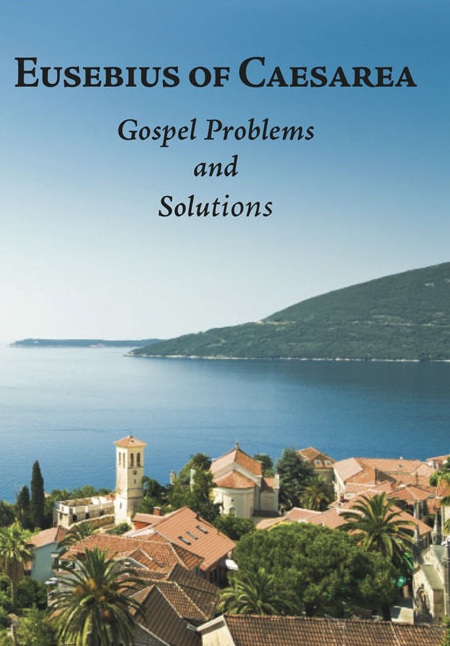
 |
Freethought & Rationalism ArchiveThe archives are read only. |
|
|
#1 |
|
Veteran Member
Join Date: Apr 2002
Location: N/A
Posts: 4,370
|
Long-term readers will be aware that I commission translations of ancient texts from time to time, which I generally put online and in the public domain. The texts I attack are those which are not translated.
One such text was a bit big for this approach. This was the remains of Eusebius of Caesarea's book on the differences between the gospels, and the solutions that he saw to them. In Latin the book is known as the Quaestiones ad Stephanum et Marinum. It consists of 16 "questions" or problems, such as why the genealogies of Jesus differ in Matthew and Luke, and why there are different endings to Mark's gospel. What I did was commission a translation, and then publish it properly, with facing original language text. I've mentioned this project a number of times, so I hope I may be forgiven for letting people know about it now? The idea is to sell enough copies to recover the costs, and then put the translation on the web. So all sales go to a rather good cause! Doing the book turned out to involve a long epitome in Greek; then long fragments of the full text, taken from Greek medieval gospel commentaries; then similar stuff from Latin and Syriac. In fact I discovered that there were extracts in Coptic and Arabic as well, and I included these. The book is now available, translated by David Miller, Adam McCollum and Carol Downer. The epitome reprints the critical text from Sources Chretiennes by Claudio Zamagni. In truth the book is rather academic, being aimed mainly at libraries. The hardback is the more impressive, but the content is the same. The US sites also include a "look inside" feature. It's also on Amazon.co.uk. You can also get copies from the Chieftain Publishing site, at a 20% discount, here. I've put an image of the front cover at the bottom. There's a PDF with some sample pages here. There's a publicity leaflet here. Any questions, just ask! All the best, Roger Pearse 
|
|
|
|
|
#2 |
|
Veteran Member
Join Date: Mar 2002
Location: Perth
Posts: 1,779
|
Good work Roger :-)
(Hmmm... I wonder if I can get it on Kindle.) K. |
|
|
|
|
#3 | |
|
Veteran Member
Join Date: Apr 2002
Location: N/A
Posts: 4,370
|
Thank you. It's so obviously interesting a work that I was amazed that no-one had ever translated it into English ... until I worked out that the different languages meant a team of translators was needed.
Quote:
Perhaps there might be a market for a kindle book that just had the translation, perhaps? How important is the Greek etc to most people? Roger |
|
|
|
|
|
#4 |
|
Veteran Member
Join Date: Apr 2005
Location: USA, Missouri
Posts: 3,070
|
Hi Roger,
Are there a lot of books or shorter writings like these that remain untranslated? Are there a lot of writings sitting on shelves or basements in monasteries, libraries, etc. that perhaps haven't been read for centuries and could contain real gems of information--maybe things that would lead to significant discoveries? Just curious.. Ted |
|
|
|
|
#5 | ||
|
Veteran Member
Join Date: Apr 2002
Location: N/A
Posts: 4,370
|
Quote:
We are extremely fortunate in the English-speaking world that the Edinburgh editors of the Ante-Nicene Fathers decided to translate everything before Nicaea in 325. They couldn't get enough subscriptions to translate the homilies of Origen, and of course a few works have come along since, but they did a marvellous job and English is one of the few languages where all the stuff in that period is done. But after that it's another matter. Vast reams of patristic stuff is untranslated. Likewise vast tracts of pagan literature remain untranslated. Something like 20% of all ancient Greek literature is made up of the works of the medical writer Galen (ca. 200 AD). Most of this is untranslated too. A project has just started to try and translate them, so it will happen. So yes ... throw a brick and you'll find an untranslated text. Quote:
But mostly it is a case that much of the stuff is boring -- medieval sermons and the like -- which is why it sits unread. On the other hand, no text which is unread can certainly be said to be boring, as ... well, no-one is reading it to see! And boring or not, it all ought to be accessible. Then again you find stuff like John the Lydian, On the Roman Months. I've commissioned bits of it, and will do more; and it's fascinating raw material on the ancient world. Yet no translation exists outside of what I've had done. So yes, it's all to play for. All the best, Roger Pearse |
||
|
|
|
|
#6 | |||
|
Veteran Member
Join Date: Apr 2005
Location: USA, Missouri
Posts: 3,070
|
Very fascinating Roger. Thanks!
Quote:
|
|||
|
|
| Thread Tools | Search this Thread |
|